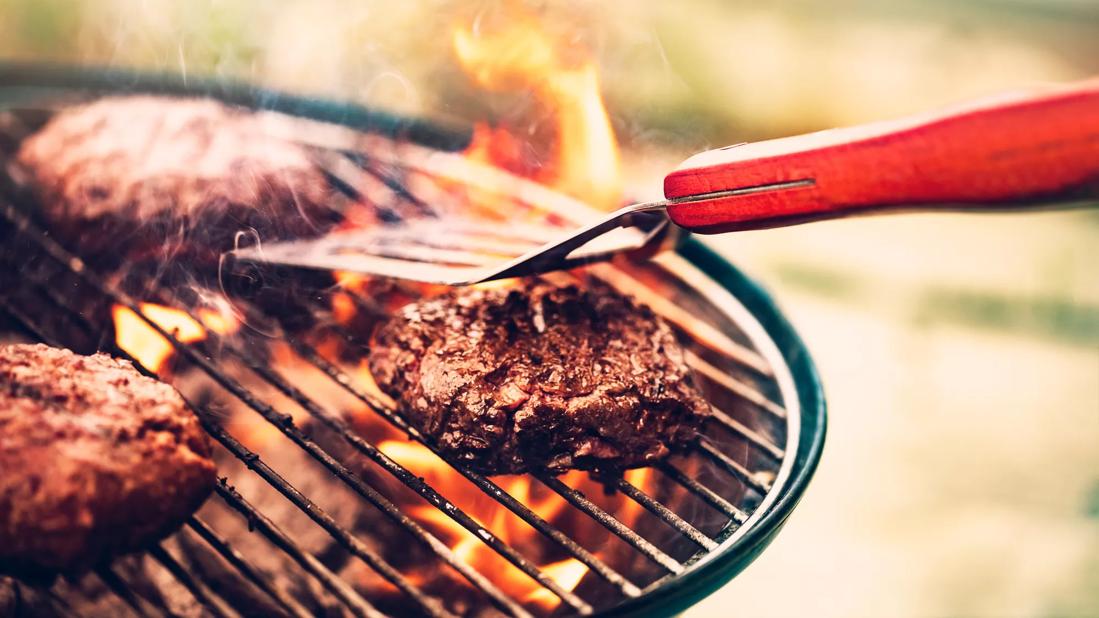Study finds more heat could raise blood pressure

You may have heard that eating grilled meat that is charred can put you at higher risk for high blood pressure. But it’s not just outdoor cooking that’s the culprit. Any high-temperature cooking — grilling, roasting or broiling — can increase your chances of developing hypertension.
Advertisement
Cleveland Clinic is a non-profit academic medical center. Advertising on our site helps support our mission. We do not endorse non-Cleveland Clinic products or services. Policy
“When you cook the meat to high temp and you char it, there’s a certain chemical that starts to form that may lead to high blood pressure over time,” says preventive cardiologist Haitham Ahmed, MD.
Researchers confirmed the link between high-temperature cooking and high blood pressure in a study that followed more than a 100,000 people over the course of 12 to 16 years. The results show that those who frequently cooked red meat, fish or chicken at higher temperatures were more likely to develop high blood pressure.
“The people who had the highest risk were grilling 15 times a month — that’s every other day,” Dr. Ahmed says. The study found that those in this group had a 17 percent higher risk of hypertension than those who cooked their meat at high temperatures only four times per month.
The cooking method wasn’t the only factor that boosted hypertension risk. The study also found that those who ate the most charred meat had a 17 percent higher risk of high blood pressure. Those who ate their meat well-done boosted their risk by 15 percent.
High blood pressure can lead to heart attacks, strokes, or kidney and heart failure, but generally has no symptoms. Even if you aren’t aware you have it, it can still damage your heart and blood vessels.
Advertisement
That’s why it’s important to have your blood pressure checked regularly and to understand what the numbers tell you about your heart health. If you do have high blood pressure, getting it under control can help you reduce your overall risk of heart disease or other life-threatening conditions.
If you’re wondering whether you should toss out your grill (or broiling pan), the short answer is no. Moderation is the key.
Dr. Ahmed says you don’t need to give up open-flame cooking and other high-temp methods completely. But it is a good idea to limit how often you grill your meat — maybe once or twice a week — and try to avoid charring. He also recommends cutting down on red meat in general, which typically comes with more sodium.
From Dr. Ahmed’s perspective in his focus on prevention, you should aim for a comprehensive approach to managing all the risk factors for high blood pressure — from being overweight to having a sedentary lifestyle. It’s important to develop lifestyle changes that emphasize exercise, a healthy diet and stress reduction, he says.
Advertisement
Learn more about our editorial process.
Advertisement

This color additive, found in many pre-packaged foods, may affect people with ADHD or allergies

With a focus on internal cues for hunger and fullness, this eating style may revolutionize your relationship with food

Review the ingredients, watch for sugar and fat, and choose one with the right amount of protein for your needs

Getting the hang of portions can help you better understand how much to put on your plate

A typical recommended balanced diet is half fruits and veggies, a quarter protein and a quarter grains

Foods high in protein, fiber and water can help keep hunger at bay

This quirky food trend is harmless, as long as you’re getting enough protein, fiber and healthy fats

With a little planning, you can fill your belly and boost your energy

Wearing a scarf, adjusting your outdoor activities and following your asthma treatment plan can help limit breathing problems

Your diet in the weeks, days and hours ahead of your race can power you to the finish line

When someone guilt trips you, they’re using emotionally manipulative behavior to try to get you to act a certain way